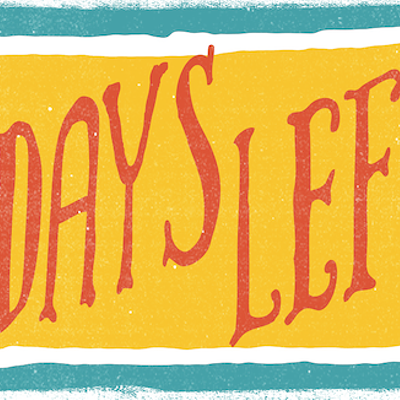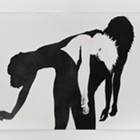Steve Wing’s tale about the mysterious routine and ambiguous end of one family’s patriarch.
Vagabond
By Steve Wing
We suspected something was up when we noticed Grandfather confronting the hall mirror, stroking his silver beard and calling himself names.
“Vagabond,”he said. “Rambler. Mudlark. Bohemian.”
He’s been retired for years, but now it seemed like he was finally catching on that times had turned hard and were getting harder. Still, we didn’t think anything would come of this. We just expected he’d go on doing what he’s always done.
In the morning, he’d open his Wall Street Journal, and go through it carefully, notating headlines and quotations and advertisements. He used to underline lightly, but now he covered the paper with dotted lines and arrows, with crowns and anchors and lightning bolts. We never knew what these symbols meant as far as his investments went, or even if he had any investments these days. Anyway, he’d never let anyone look at a particular Journal until it was at least a week old. He said no one else in the family was capable of handling a fresh one.
In the evening he would pour his whiskey, and light a cigar. We weren’t sure if he really liked those cigars, because he would puff on one just enough to keep it lit, but he did like his whiskey. Then he’d select one of his books, gold lettered, leather bound, beautiful: Dickens or Trollope or Thackeray. He’d read until his eyes grew heavy, and then he was off to bed. If the whiskey wasn’t doing the trick, he’d take a few drops of laudanum. On the wall of his bedroom he had a framed quote by Vachel Lindsay: “Courage and sleep are the principal things.”
We were ordered to keep our hands off those books. No one ever borrowed them, or even touched them. Nothing meant more to him than his books, and we knew that he had set aside funds to keep them together as their own collection after he was gone.
That’s why we were so surprised when he started giving them away, or so it seemed. Was he selling his books, trying to drum up income? This was almost impossible to believe, but money was known to have exchanged hands. When he was asked about it, all he would say was, “We all have to cope as best we can during the present crisis.”That’s the same thing he said when Eddie finally got work, building stone walls for the WPA. Eddie had shrugged, but this was actually an improvement over what Grandfather said about Leonard the Lawyer –Grandfather’s cousin –when he had his episode, as Grandfather called it. The rest of us called it a breakdown, but Grandfather said, “We’re not the sort of people who break down. On occasion, one or another of us may fail to proceed, but we do not break down.”
Leonard resented Grandfather’s attitude about the whole thing, though we didn’t realize how much for a long time.
The books weren’t the only things that went. He apparently sold his silver fountain pen, and his silver pocket watch. And he pawned his pewter shaving mug. So when he shaved off his beard, he had to make do. First, he polished the mirror with vinegar water and squares of newspaper. Then he stropped his straight razor, the old one. When he was finished, he held the razor up to the light, claiming it was so sharp he could slice a sunbeam right down the center. Then he fetched the barbecue mug down from the mantel. “Sometimes, these days,”he said, “we are required to use things for purposes other than those originally intended.”
The barbecue mug –a souvenir he’d brought back when the entire Southeast territory had been his –was one of those things. It held pride of place for years afterward, and we imagined it still held a frail ghost of pepper and Ivory soap, brown sugar and smoke.
When he finished shaving, he looked himself over in the mirror. Quoting Edward Arlington Robinson, he pronounced himself “clean favored and imperially slim.”
Then he put on his last good suit, tucked the classified section of the Chronicle under his arm, and walked out the front door.
After he died, we pieced together what Grandfather did on the days he went hunting for work. We think he sometimes just went down to the park and sat there all morning. Other times he apparently boarded a street car, rode to the end of the line, and then rode it back. Sometimes he wandered downtown and the merchants there –some of the same people who were taking his books off his hands –occasionally found things for him to do. There were figures to add up, files to straighten out, letters to copy in his perfect handwriting. They always paid him in cash, and he was always back home before sundown.
When Grandfather died, Leonard announced his death to more than one member of the family by saying, “Well, what happened was that he failed to proceed this morning. I’m telling you, he sincerely failed to proceed.”
Grandfather was found lying on his bed, on top of the covers, fully dressed, freshly shaven. And we found over fifty dollars in small bills and coins –the gatherings from his trips downtown –in the pockets of his vest and overcoat.
And that would have been that, if Leonard the Lawyer hadn’t been working for Sentinel Life Insurance, who decided to contest the payoff. Leonard said, of course Grandfather had been getting rid of things, that was a clue. That’s what suicides do, he said. They can’t take it with them, so they give it away first.
Leonard also made much of the fact that Grandfather had been lying on his bed with his clothes on, impeccably dressed. Leonard said that he’d obviously been laying himself out for eternity and wanted to look good.
We argued with Leonard. It wasn’t as though we wanted the insurance money, though we did need it. We said, sometimes Grandfather would dress up the night before, to be ready for the following day. We said, sometimes after a bad night he felt that his best clothes might help him have a good night. We said, or maybe he just got up early –he did that sometimes –and got dressed, and then felt lightheaded and lay back down.
Of course he was lightheaded, Leonard said. A decanter of whiskey, a flask of laudanum, right there in the room with him? He knew how to take those materials properly, he knew how to take too much, and that’s what he did, Leonard said. And what about those words on the bedroom wall, about Courage and Sleep? A suicide needs courage, to follow through with his plans. And a suicide is certainly interested in sleep, Leonard said.
Then Leonard the Lawyer brought out the evidence that Grandfather had actually met Vachel Lindsay, the poet who wrote those words, at the Davenport. And what happened to Vachel Lindsay? He killed himself.
Even this evidence might not have been damning, except for the fact that Grandfather had given his books away. That seemed to be the nail in the coffin of Leonard the Lawyer’s case. The judge was wavering, and it looked like Leonard and Sentinel Life Insurance would be the winners after all.
Then the books started returning, at first in a trickle, and then by the dozens, by the hundreds from all over town. Grandfather’s money making scheme had been a lending library, with a token fee for each book. Now the books were coming back, and in every one of them Grandfather had written on the flyleaf:
My friend, dear friend, for friendship’s sake
Return the book I let you take
Lord bless the reader’s long rich look
But damned be he who keeps this book…





















